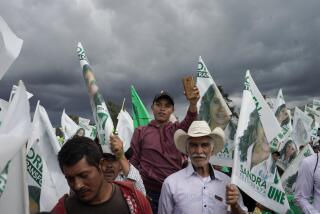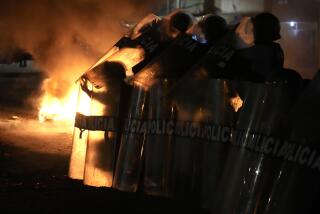A $1-million shortfall is threatening help for human rights victims in the Americas
- Share via
Reporting from WASHINGTON — A U.S.-backed commission that helps provide justice for victims of human rights abuses in the Americas is in danger of collapse because of a severe cash crunch.
Advocates say some donor governments may be happy to see the Washington-based Inter-American Commission on Human Rights falter because it has harshly criticized them.
Hearings and fact-finding trips have been canceled for the rest of the year and nearly half the 78 staff members will be laid off this summer if the commission can’t make up an immediate $1-million shortfall, officials said.
As a result, pending investigations -- including those looking into allegations of rapes of indigenous women by the military in Central America and the disappearance and suspected murder of college students in Mexico -- could collapse.
Created in 1959, the seven-member panel has investigated thousands of complaints of torture, executions and other abuses of labor leaders, gay activists, environmentalists, journalists and others, especially under authoritarian regimes in Central and South America.
The commission is an autonomous arm of the Organization of American States, which is asking its 35 member nations, including the United States, for help. The OAS promotes democracy, development, human rights and security from the Arctic to Tierra del Fuego.
Several member nations normally provide half the commission’s $10-million annual budget, with the rest coming from a few of the nations that hold “observer” status at the OAS, or from other sources.
But several member states have been slow to pay, or have reduced their donations. The problem worsened recently when “observer” nations Norway and Sweden, which are overwhelmed with refugees from Syria and elsewhere, cut all their contributions.
The commission’s fate is expected to be debated next week during the OAS General Assembly meeting in Santo Domingo, Dominican Republic.
“Having to ask [governments] for money is not the best way to ensure our autonomy and independence,” said James Cavallaro, a U.S. member of the commission and professor of law at Stanford University.
He noted that Latin American and Caribbean countries last year donated $13.7 million to the International Criminal Court, where the region has no cases pending. The tribunal, based in The Hague, is the jurisdiction for prosecution of genocide, war crimes and crimes against humanity.
See the most-read stories this hour >> »
But they gave only $200,000 to the human rights commission, which is examining hundreds of complaints against governments in the Americas, including those in Honduras, Guatemala and Venezuela.
“We are constantly subject to the political will” of governments, “and that political will comes and goes,” Cavallaro said in a telephone interview from Santiago, Chile, where the commission was holding its final hearings of the year.
“The situation is dire and is now affecting some of the most important functions and organs of the OAS,” a U.S. representative to the group, Genevieve Libonati, told its permanent council on May 25. She urged other nations to contribute, saying the United States alone should not foot the bill.
Together with the Inter-American Court of Human Rights, another OAS body based in San Jose, Costa Rica, the commission is the last hope for people to challenge governments. Unlike the court, the commission can take both political and legal stands.
In the commission’s best known case of late, a team of appointed experts conducted what is widely considered the only credible investigation of the 2014 disappearance and likely massacre of 43 college students in Mexico.
Their report contradicted the Mexican government’s version by suggesting greater police involvement and shoddy investigations by authorities. The case remains unresolved, and the commission wants to continue its inquiry.
A landmark commission case in Costa Rica in 2004 protected journalists from criminal prosecution based on what they write.
The court sometimes orders countries to protect people facing danger, though it doesn’t always succeed.
In March, a Honduran environmentalist and indigenous-rights activist, Bertha Caceres, was shot to death in her home despite a 7-year-old protection order issued by the commission.
“Thousands of people have been able to turn to the commission,” said Gaston Chillier, executive director of the Argentine Center for Legal and Social Studies, which fights for human rights. “This crisis will leave society in the Americas more vulnerable to state abuses.”
Chillier recalled in a telephone interview from Buenos Aires how the commission’s work gave Argentines courage to come forward and denounce widespread kidnappings and executions by government forces in the so-called Dirty War from 1976 to 1983.
“We look to the commission as the model for regional human rights systems,” James Goldston, executive director of the New York-based Open Society Justice Initiative, which works on legal reforms worldwide. “It is a vital ingredient for the protection of human rights and the rule of law throughout the Americas.”
The commission normally employs 32 lawyers. Currently, 21 lawyers and assistants are handling 6,188 petitions and cases. If layoffs occur, only seven lawyers will handle the entire caseload, according to a spokeswoman, Maria Isabel Rivero.
About 25 intellectuals, writers and free-speech groups from across North and South America, under the auspices of PEN International, issued a public letter Thursday, saying they were “dismayed” by the crisis and the “devastating impact” it would have on human rights.
They called for urgent funding from member states and other potential donors. Signatories included Nobel literature laureate Mario Vargas Llosa of Peru, Canadian novelist Margaret Atwood and Mexico’s grande dame of letters, Elena Poniatowska.
Amnesty International and dozens of grass-roots organizations also circulated a petition urging creation of a permanent fund for the commission so financing can’t be held hostage to politics.
“The health of the commission has to be a priority for member states,” said Amnesty’s advocacy director for the Americas, Marselha Goncalves Margerin. “For years, the commission has been the last resort for those who have suffered egregious human rights abuses.”
Join the conversation on Facebook >>
ALSO
China will not build L.A.-to-Vegas rail line — U.S. company calls the deal off
Clinton is set to make history, but female leaders are nothing new in other parts of the world
What India’s film censors worry about: long kisses, gay themes and now a gritty story about drugs
For more news on foreign policy, follow @TracyKWilkinson on Twitter.
More to Read
Sign up for Essential California
The most important California stories and recommendations in your inbox every morning.
You may occasionally receive promotional content from the Los Angeles Times.










